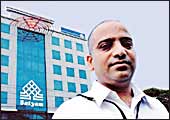 |
A great brand undone
by half-hearted marketing and ruthless Korean rivals. That's the
story of Sony in India. Although the Japanese consumer electronics
giant has been in the country for 10 years, it's a minnow compared
to LG and Samsung, which have racked up revenues of Rs 4,500 crore
and Rs 4,000 crore, respectively (January-December fiscal year),
compared to Sony's Rs 850 crore. According to published figures,
Sony claims to have a marketshare of 8 per cent in the 'entertainment
systems' category, which includes both audio and video. Now, Sony
has decided that it won't make audio systems in India. Instead,
products will likely be sourced from Thailand, following the Free-Trade
Agreement signed between India and Thailand , where it has a much
bigger facility compared to the 2 lakh audio units-a-year plant
in Daruhera, Haryana. Will CTVs be next? "No decision has yet
been made on CTVs," says Mohit Parashar, General Manager (Audio
Visual Systems), Sony India. But unless the company gets its act
together, CTVs may inevitably follow the audio line out of India.
-Kushan Mitra
"Organised
Crime Is Also Spreading Virus"
The recent spate
of internet viruses has hit one company harder than others: Microsoft.
Will Poole, VP and Head of the Windows division, spoke
to BT's Kushan Mitra on the company's
bid (in the form of Windows XP Service Pack 2) to fortify its software
against viruses. Excerpts:
What's behind the massive rise of viruses
and worms on the internet?
A great deal of malicious code is being written
by young kids who want bragging rights inside their circle of friends.
(The recent MyDoom virus was created by a 17-year-old boy in Germany.)
And recently, there has been a perturbing trend where we are seeing
organised crime also start to distribute malicious code over the
internet usually as email attachments.
How will Win XP SP2 change all that?
SP2 has some radical changes over previous versions
of Windows when it comes to the security front. There are four new
levels of protection-starting from fundamentally stronger security
settings-the Firewall is enabled when the software is installed.
Email attachments on Outlook Express are quarantined if they are
non-known types and the program works better with the anti-virus
software. The default settings on Internet Explorer are enhanced,
preventing malicious ActiveX code from installing itself on your
computer. And finally, the fourth improvement has been the modification
of the compiler code, which prevent the buffer overruns, which allow
these viruses and worms to propagate. If SP2 was available on the
market earlier, the massive outbreaks of the past could have been
prevented, but we have working to get this on the market as fast
as we could.
What is happening on the Longhorn project,
the successor to Windows XP?
Frankly, the Longhorn project took a hit in
the past few months as a majority of the Windows development team
worked on getting SP2 to the market as fast as possible. But, we
have made progress and we should have a beta version out by next
summer.
Bulking
Up On Generics
Indian drug companies line up to sell directly
in the US.
 |
| Strategy shift:
They don't need no distributors |
There's
a new buzzword doing the rounds of pharma companies in India, and
it is "front-end model". Huh? Made popular by industry
analysts on Dalal Street, the phrase indicates a significant, albeit
riskier, shift in marketing strategy of generics abroad-especially
in the "regulated" markets of the US and Europe. So far,
most of the big Indian companies have sold generics abroad via distribution
partners. Now, they want to build their own sales force to push
their products. Ranbaxy and Sun Pharma already do that. Following
suit is a bunch of others, including Dr Reddy's Labs, which is working
on building a field force in the once it is ready with a specialty
product, and Wockhardt, which set up a distribution arm in the US
this April to supplement its sales initiatives. Ditto Glenmark and
Aurobindo Pharma. The former's US subsidiary won't just market formulations,
but file for drug approvals too, while the latter-primarily a bulk
drug manufacturer-is gearing up for a generics launch. What's prompting
Indian companies to abandon, at least partly, their marketing partners?
The fact that the generics market in the US alone is expected to
touch $19 billion by 2005, and that there's more money to be made
when there's no partner to share the revenues with.
-E. Kumar Sharma
Hyderabad's
Techies Come Home
Returning software engineers are easing up the
IT job market in Cyberabad.
 |
| Satyam's Ravi
Gottiparthy: Happy to be back home |
I
work at the corporate headquarters, head a large team, 'am close
to my family and get to spend more time with parents and relatives,"
says Ravi Gottiparthy. The 37-year-old software professional moved
base from Massachusetts in the US to Hyderabad, where he works for
Satyam Computers, in June this year and is trying to explain why
the move has been good for him. Actually, the move's been good for
his employer too. Satyam, for instance, has been hiring, on an average,
at least two such tech returnies every quarter for the last three
years, and some of the hires have been at the director and senior
vice president levels. A.S. Murty, Director & Senior VP (HR)
at Satyam, sees this as a growing trend. Says he: "Rise in
compensation levels and opportunities to return home along with
greater end-to-end responsibilities at workplace are attracting
people back." That's benefitting other city companies such
as VisualSoft, Infotech Enterprises and ADP, an American firm.
While the growing influx may not have softened
compensation (in 1995 a project manager in Hyderabad was earning
between Rs 3 and 4 lakh; now the figure is between Rs 12 and Rs
13 lakh) it certainly has improved the quality of talent available
in the city. For employers, that's bargain enough.
-E. Kumar Sharma
Weighing
In On Lodha
The Birlas launch a new line of attack against
the ''outsider'' R.S. Lodha.
 |
| R.S. Lodha:
In the eye of the storm |
The
e-mailed press release was short and terse. Issued by a pr firm
on behalf of the Birlas on August 17, 2004, it announced that N.G.
Khaitan, solicitor, "had filed a petition seeking probate of
two mutual and concurrent wills of late M.P. Birla and Late Priyamvada
Birla. The mutual wills of 1982 bequeaths (sic) their entire estate
to charity." This was preceded by a press conference at which
Khaitan released to the media copies of the mutual wills, made on
July 13, 1982. He also said it was M.P. Birla's wish that his properties
be donated to charity after Priyamvada's death.
While that may well have been the case, a plain
reading of the will doesn't say so. The relevant paragraph (Clause
2) says: "Subject to the payment of testamentary expenses and
dues of the estate duty...I bequeath all my properties...to my wife
Shrimati Priyamvada Devi Birla absolutely and in the event of my
wife predeceasing me the executors shall make over and/or donate
and/or settle for public charitable purposes my estate as they may
think fit...." Priyamvada Birla's "concurrent will"
is almost identical.
Lawyers point out that the word "absolutely"
in M.P. Birla's will is crucial. It means that his wife became absolute
owner of his estate on his demise and was free to do what she wanted
with it. "The clause on charity would come into play only if
Priyamvada predeceased him," a lawyer points out. Coming to
the "concurrent will" that Priyamvada Birla made in 1982,
she admittedly did leave her assets to charity by this document,
but in the subsequent will of 1999 (which gave her estate to R.S.
Lodha), she clearly writes: 'Any will made prior to this date stands
cancelled'.
| BIRLA STAND |
LODHA'S LIKELY RESPONSE |
| »
M.P. and Priyamvada Birla's mutual and concurrent
wills leave their estate to charity |
M.P. Birla's will does not spell
it out. It talks of leaving his estate to charity if his wife
predeceases him |
| »
Priyamvada Birla had only a life interest
over the estate and could not have given it away to R.S. Lodha |
Priyamvada was absolute owner of
the estate and could give it to anyone she wanted to |
| »
Priyamvada Birla's 1982 will leaves her estate
to charity |
The 1999 will clearly cancels any
previous will |
| »
G.P. Birla, Kashi Nath Tapuria, Pradip Kumar
Khaitan and one nominee chosen by them are executors of Priyamvada
Birla's estate |
The 1982 will was superseded by
the one made in 1999, so the provisions of the earlier will
are no longer valid |
"She was well within her rights to do so,"
the lawyer points out. Therefore, it follows that she was also within
her rights to leave her assets to any person of her choice. "My
client is on very strong legal ground," claims Debanjan Mandal,
Lodha's solicitor.
The Birlas and their legal advisors obviously
know this. So why are they following this line of attack? At the
press conference, Khaitan had repeatedly stressed that Priyamvada
Birla did not and could not have made the 1999 will. Asked pointedly
if he was accusing Lodha of obtaining the will by fraud, he evaded
a direct reply. "We'll tell the court what we have to say,"
he said. There have been subsequent reports of Priyamvada Birla's
ill health, her unpredictable behaviour-all pointing to loss of
testamentary capacity.
The Birla strategy seems to have short-term
and long-term components. First, throw a shroud of doubt and uncertainty
over the 1999 will and hope that the court appoints an independent
administrator for the M.P. Birla Group. This will deny Lodha the
advantage of incumbency and control. The long-term plan seems to
be to avoid the uncertainties of the Hindu Succession Act 1956,
which will come into play if the 1999 will is set aside by the courts
(see Business Today issue dated August 15, 2004). If the court does
quash the 1999 will, the previous will (1982) will come into force
and its executors-G.P. Birla, Kashi Nath Tapuria, Pradip Kumar Khaitan
and any person chosen by them to replace the deceased fourth executor
M.P. Birla-will gain control of the estate. The Birla family and
its immediate circle will then decide how best to execute M.P. and
Priyamvada Birla's desire for charity.
-Arnab Mitra
|
